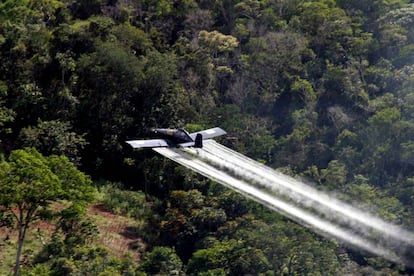Glyphosate spraying in Colombia, in a file image.
The government of Iván Duque is on the verge of fulfilling its long-delayed purpose for Colombia to return to the questioned aerial spraying of glyphosate against coca leaf crops.
The president, who has just over a year in office, signed on Monday a decree that establishes the rules of aerial spraying to regulate "the control of risks to health and the environment", and thus comply with some of the the requirements that the Constitutional Court has demanded.
Since spraying was suspended in 2015, academics, environmentalists and social organizations have rejected the use of this potentially carcinogenic herbicide.
The ad reopens a discussion that has sparked passions over the years.
Duque himself has insistently argued that Colombia needs all the tools to combat drug trafficking, including glyphosate.
His predecessor, Juan Manuel Santos, advocated changing the focus in the global fight against drug trafficking, and asked to address the problem as a matter of human rights and public health - even in his speech accepting the Nobel Peace Prize for the agreement. that he sealed with the FARC.
The current president has marked a harder line and a return to prohibitionism, at the same time that he has favored forced eradication to the detriment of the voluntary substitution agreed with the peasant communities.
Colombia has sprayed illicit crops with glyphosate since the 1980s.
Although the United States promotes its use, the Santos government suspended aerial spraying in 2015 due to recommendations from the World Health Organization (WHO) and a Constitutional Court ruling that appealed to the precautionary principle.
In another judgment of 2017, the high court determined, among other requirements, that the authorities can only reactivate the fumigations if they establish with scientific research that these sprays do not harm health or the environment.
This week's decree "does not automatically reactivate the program for the eradication of illicit crops by aerial spraying, and for this purpose it is necessary for the National Narcotics Council [CNE] to verify compliance with the established requirements," the Minister of Justice added. , Wilson Ruiz.
"The program will be focused on industrialized and technified crops, and new crops with the interference of organized armed groups, residual and criminal drug trafficking groups," said his Cabinet colleague in the Defense portfolio, Diego Molano, who predicts that the sprinkling will be reactivated this quarter, in a process that could last until June.
Several steps are still missing for the public force planes to drop the herbicide on the coca crops.
Among others, the concepts of the National Institute of Health and the National Environmental Licensing Agency, so that the Executive can summon the CNE, the national drug policy entity.
Several fronts are still involved in legal proceedings.
However, it is taken for granted that the CNE will approve the fumigations, since most of its members are officials appointed by Duque.
"The Government has been absolutely deaf to criticism," says Isabel Pereira, coordinator of the drug policy area of the Dejusticia think tank, who highlights among various pronouncements the letter from the end of last year in which seven United Nations rapporteurs - that of Toxic Substances, that of Afro-descendants, that of the Environment, that of the Right to Food, that of the Right to Health, that of the Situation of Human Rights Defenders and that of the Rights of Indigenous Peoples - they asked Duque not going back to glyphosate.
"The decree is a defiant act of stubbornness that shows that they are not interested in listening to the international community, nor to the academic community, much less to the communities that would be affected by the spraying," says Pereira.
"The evidence is not going to affect the way they make decisions," he laments, noting that the regulations still have gaps with respect to the standards set by the court.
Colombia remains by far the world's leading producer of coca leaf, the raw material for cocaine.
After reaching historic highs, the hectares devoted to coca have begun to show a downward trend in the Duque government thanks to years of enormous efforts.
The total area was located at 154,000 hectares at the end of 2019, according to the most recent report of the United Nations Integrated Monitoring System for Illicit Crops (SIMCI), the official measurement.
It was the second consecutive year of a modest decline from a record 171,000 hectares in 2017. The government blames drug trafficking for the country's security crisis, which includes a growing number of massacres and the incessant murder of social leaders.
“Insecurity in the Colombian countryside has steadily worsened in recent years as armed groups compete with each other and confront the Army. Redoubled eradication, and potentially aerial spraying, could intensify violence by pushing farmers into the clutches of armed groups, without stopping the replanting of coca, ”a report from the International Crisis Group think tank warned in February. “Colombia and the United States, the main external backer of heavy-handed counternarcotics policies in Latin America, should turn the page on the use of force against coca growers in an attempt to reduce the world's supply of cocaine. Boosting rural economies, going ahead with crop substitution and avoiding confrontations with growers would be a better policy, ”the document concluded.

